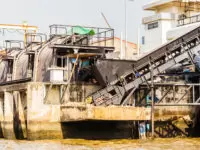
They study environmental data from the past collected from fossilized organic material and chemical analyses.
What Does a Paleoecologist Do?
The majority of paleoecologists work in the field. Their major role is collecting environmental data from as wide a range of sources as fossilized animals (including shell, chitin and bone fragments) and plants, microfossils (such as spores and pollen, and from chemical analyses of air trapped air pockets. How this information is used builds a picture of an ancient ecology. For example, they may wish to study the carbon or other greenhouse gas levels during the Cambrian Explosion. They may wish to study which flora were prevalent in a given area at a certain time in history.
They may also attempt to reconstruct an environment from the last Ice Age. For example, Arizona may be a desert now, but some areas were swamp in the past. Reconstructing this environment and the lifecycle of the biological life that habited the area can help us understand how wetlands become arid and vice versa, or how any fundamental shift can change one landscape type into another.
Ecology is one of the umbrella environmental sciences. It focuses on the bigger picture and its data often compiles into broader regional, continental or global pictures. There is also a requirement for office-based researchers. Those who do not work in the field may work in research labs and offices, compiling research data for analysis or report writing, using technology such as GIS and statistical software such as SPSS.
Where Does a Paleoecologist Work?
Although ecologists and paleoecologists examine and use similar data, their employment areas are generally different. Whereas ecologists provide information to governments and private bodies, typically hired as a third party to investigate an area ahead of development to make decisions now, paleoecologists are concerned with examining the ecology of the past, and not the present. However, their data can tell us much about the present and the future.
The majority of paleoecologists, due to the data that they handle, will work in research labs and academia. Much of this information is not necessary for immediate public use, but it is useful to the global community of environmental science researchers and teaching staff. It is fundamental to government science bodies, influencing national government policy and influencing international efforts. Our understanding of the environment is a combination of present and past ecologies.
Some will work for environmental consulting companies assessing project impact. They may work with ecologists but look at much older data, perhaps looking for such information as proneness to flooding. They may also carry out an assessment to ensure there is nothing paleontologically sensitive beneath the ground.
A small number work for government bodies researching in publicly owned protected landscapes (for example, National Parks) managing and researching projects of academic or general interest. They will be involved, directly or indirectly, in influencing policy.
What Is the Average Paleoecologist's Salary?
Paleoecologist roles are few in number as this is a niche area. Data for this career type uses details from BLS Geosciences classification. According to 2015 data, the median salary for all geoscientists was $89,700. The lowest 10% earned $47,250 and the highest earned $187,200. However, the highest paying roles were in the oil and gas sector. There is little demand for paleoecology in this area so the median salary for this type of role is likely to be lower, closer to the median of $66,230 for academic roles. Private industry that hire this type of professional (management scientific and technical) pay higher at $73,840. Government roles and policy influence are also likely to be higher.
Paleoecology Jobs & Job Description
A Paleoecologist studies the ecosystems of the past. Through information collected from fossils and subfossils, researchers can identify the connections and relationships of living things and their environment in the past. There are several skills and tasks required for a Paleoecologist and can include:
- A degree or dual degree in paleoecology, geology, earth sciences, paleontology or related field of study
- Conduct field studies outdoors in variable environmental and weather conditions
- Extensive travel may be required to work in various field research locations
- Capacity to produce and take measurements of striations and sections of the earth using heavy machinery
- Ability to observe and characterize sedimentary rocks and identify fossil formations
- Capacity to document, preserve, store and organize fossils and subfossils collected through field research
- Analyze fossilized organisms and sections of the earth using microscopes and associated tools in a laboratory environment
- Categorize fossils and subfossils to allow for future researchers or curators to locate research
- Create databases for environmental and fossil information
- Conduct research and analyses from organized collections of fossilized specimens and environmental data
- Possess knowledge of applicable laws, codes and regulations, such as those regarding field research or specimen collections for museums
Senior level Paleoecologists will be influenced by the place of employment, which commonly includes venues like museums, post-secondary institutions around the world or in a consultancy. While the role will vary, below are many of the tasks that a senior Paleoceologist will perform
- An advanced degree in paleoecology, geology, earth sciences or related track
- Capacity to oversee the collections of paleoecological research in museums
- Ability to manage research volunteers, staff and students during field exploration for fossils and subfossils
- Provide training to staff and volunteers and design necessary training programs
- Capacity to catalogue and manage access to research collections
- Possess excellent communication skills and advanced knowledge and teaching ability to instruct and teach community members and students about paleoecology
- Drive to develop lectures and lab assignments for students at the university level
- Establish all aspects of research projects, including budgets, field locations, staffing, equipment required and research methods used
- Advise students in components of paleoecology when teaching at a university or college
- Retain a strong desire to investigate historical remains and artifacts
- Develop innovative methods for fossil discovery and field exploration
What Is the Job Demand for Paleoecologists?
In the years 2014-2024, demand for all geoscience professionals is expected to grow some 10%. What impact this will have on paleoecologists is unclear. Their multidisciplinary approach and broad skill set could be as high as 10%. Despite being a small niche area, demand could grow based on the academic importance of understanding the ecology of the past to build environmental models of the future.
What Are the Education Requirements to Become a Paleoecologist?
As already discussed, ecology is a niche area. The student may find few openings. Nevertheless, there is a demand for this vital role. High School students should focus on the core sciences - biology, physics and chemistry, and math. Much of paleoecology's work is in studying biological material for chemical reactions for dating purposes using physics properties (typically measuring radiocarbon levels and measuring isotopes).
At degree level, students should focus (where possible) on environmental sciences. Ecology is a great example, but physics, chemistry or biology are also useful. These subjects should form the core of your studies and tailored through minors and electives. There will be few openings for undergraduates due to the data-heavy and independent nature of the research. Even for lab assistant roles, the student should make themselves increasingly employable through studying a master's degree. This is where the student may tailor their studies and begin to focus on their niche.
Doctorates will almost certainly be required for positions of authority and influence - whether in government roles, private industry or policy making. They are certainly vital in teaching and academic research.
Paleoecology - Related Degrees
What Kind Of Societies and Professional Organizations Do Paleoecologists Have?
Paleoecology is a niche, but it is vital to the overall environmental science picture.
- Intergovernmental Panel on Climate Change: The IPCC is an international body of scientists set up by the UN for delivering an objective view of climate change. They present models for public and governmental consumption in order to determine policy. They have an annual conference where they discuss science, technology and economic impacts
- Environmental Protection Agency: The government body tasked with protecting the environment, they examine the most recent research to determine what is best for the environmental protection of the country's landscapes. They use both modern and paleo data





